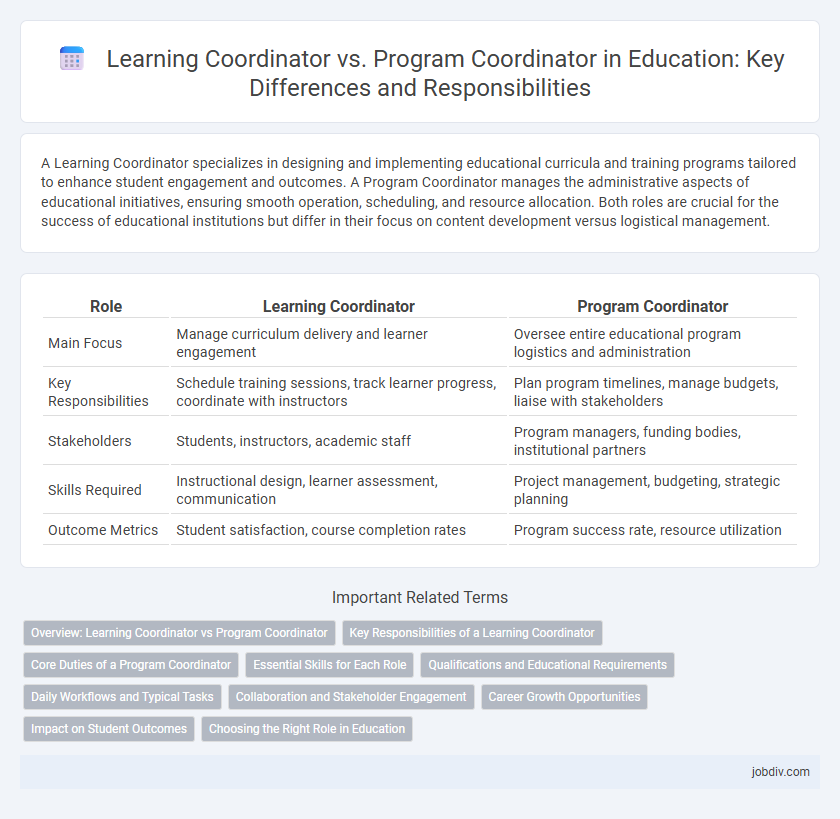A Learning Coordinator specializes in designing and implementing educational curricula and training programs tailored to enhance student engagement and outcomes. A Program Coordinator manages the administrative aspects of educational initiatives, ensuring smooth operation, scheduling, and resource allocation. Both roles are crucial for the success of educational institutions but differ in their focus on content development versus logistical management.
Table of Comparison
| Role | Learning Coordinator | Program Coordinator |
|---|---|---|
| Main Focus | Manage curriculum delivery and learner engagement | Oversee entire educational program logistics and administration |
| Key Responsibilities | Schedule training sessions, track learner progress, coordinate with instructors | Plan program timelines, manage budgets, liaise with stakeholders |
| Stakeholders | Students, instructors, academic staff | Program managers, funding bodies, institutional partners |
| Skills Required | Instructional design, learner assessment, communication | Project management, budgeting, strategic planning |
| Outcome Metrics | Student satisfaction, course completion rates | Program success rate, resource utilization |
Overview: Learning Coordinator vs Program Coordinator
Learning coordinators specialize in designing and implementing effective educational strategies and training sessions to enhance student engagement and knowledge retention. Program coordinators manage the logistical and administrative aspects of educational programs, ensuring smooth operation, compliance, and resource allocation. Both roles are essential in education, with learning coordinators focusing on curriculum delivery and program coordinators overseeing overall program execution.
Key Responsibilities of a Learning Coordinator
A Learning Coordinator manages the development and implementation of educational programs, ensuring curriculum alignment with learning objectives and student outcomes. They collaborate with instructors to organize training sessions, monitor learner progress, and provide support tailored to diverse educational needs. Key responsibilities include coordinating instructional materials, assessing learning effectiveness, and facilitating communication between stakeholders to enhance overall educational experiences.
Core Duties of a Program Coordinator
A Program Coordinator in education manages the planning, implementation, and evaluation of academic or training programs to ensure curriculum alignment and compliance with institutional standards. They coordinate schedules, resources, and communication between faculty, students, and administration to facilitate smooth program delivery. Their core duties include monitoring program outcomes, organizing events, handling budget allocations, and reporting on program effectiveness to stakeholders.
Essential Skills for Each Role
Learning Coordinators excel in curriculum design, instructional strategies, and learner engagement, ensuring effective educational delivery and personalized support. Program Coordinators specialize in project management, stakeholder communication, and logistical organization, driving program implementation and resource allocation within educational settings. Both roles require strong problem-solving abilities and adaptability to foster successful educational outcomes.
Qualifications and Educational Requirements
Learning Coordinators typically require a background in education, instructional design, or curriculum development, often holding a bachelor's or master's degree in these fields. Program Coordinators usually possess qualifications related to project management, administration, or specific program areas, with degrees ranging from business administration to specialized subjects depending on the program focus. Both roles benefit from certifications relevant to their focus, such as PMP for Program Coordinators and instructional design certificates for Learning Coordinators, enhancing their ability to manage educational initiatives effectively.
Daily Workflows and Typical Tasks
Learning Coordinators manage the design and delivery of educational content, coordinating lesson plans, facilitating instructor communication, and monitoring student progress to enhance learning outcomes. Program Coordinators handle the logistical aspects of educational programs, including scheduling, resource allocation, event planning, and compliance with institutional policies. Both roles require strong organizational skills, but Learning Coordinators focus more on curriculum facilitation, while Program Coordinators emphasize program execution and management.
Collaboration and Stakeholder Engagement
Learning Coordinators drive collaboration by aligning curriculum goals with teachers, students, and administrators to enhance educational outcomes. Program Coordinators manage stakeholder engagement by coordinating activities among faculty, community partners, and funding agencies to ensure program success and resource allocation. Both roles require strong communication skills to facilitate teamwork and foster relationships that support institutional objectives.
Career Growth Opportunities
Learning Coordinators typically focus on curriculum development and training facilitation, paving a clear path toward roles in instructional design or corporate training management. Program Coordinators oversee project implementation and stakeholder communication, which can lead to advancement in project management or educational administration. Both roles offer distinct career growth opportunities, with Learning Coordinators often advancing in educational content expertise and Program Coordinators developing leadership in program execution and organizational strategy.
Impact on Student Outcomes
Learning Coordinators directly enhance student outcomes by tailoring instructional strategies and providing targeted academic support, improving engagement and mastery of content. Program Coordinators influence student success by managing curriculum delivery and ensuring resources align with educational goals, fostering a cohesive learning environment. Both roles contribute to positive student achievement but through distinct operational approaches.
Choosing the Right Role in Education
Learning Coordinators specialize in curriculum development and instructional strategies to enhance student outcomes, whereas Program Coordinators manage administrative tasks, budgeting, and stakeholder communication for educational initiatives. Selecting the right role depends on whether an individual prefers focusing on pedagogical design and learner support or overseeing program logistics and resource allocation. Education professionals should assess their strengths in instructional expertise or organizational management to align with their career goals in academic settings.
Learning Coordinator vs Program Coordinator Infographic

 jobdiv.com
jobdiv.com